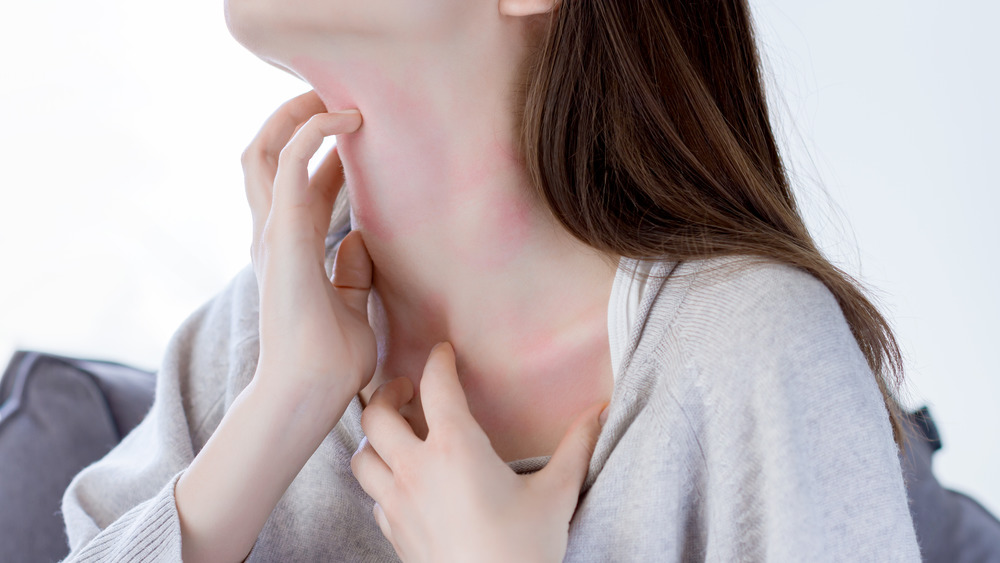What It Really Means When Your Neck Itches
If you've been feeling the urge to scratch your neck lately, you might be wondering what the underlying reason is. Apart from being uncomfortable, an itchy neck can be a symptom of a wide array of causes, and it's important to figure it out sooner rather than later. An itchy neck may feel like a ticking, irritating sensation, coined in the medical community as pruritus, and can be accompanied by redness, visible irritation, swelling, soreness, flaking or scarring (via Healthgrades). So what gives?
Your itchy neck might be caused by a variety of factors, including allergic reactions, infections, insect bites, or trauma. A healing scar can be itchy, which is a sign of healing, while a disease like chickenpox causes overall body itching accompanied by blisters. If those cases do not apply to you, eczema and contact dermatitis are common causes of an itchy neck (via Healthline), as well as head lice, scabies, pinworm, obstructive biliary disease, and chronic kidney disease, according to Healthgrades.
Although an itchy neck is usually harmless and will resolve itself, a serious food allergy can be a dangerous culprit. If your itching is sudden and severe, with an urgent need to scratch, you should see a medical professional immediately. An allergic reaction can lead to anaphylaxis, a potentially life-threatening allergic reaction that includes swelling of the face and throat, difficulty breathing, fainting, loss of consciousness, and rash. If this is the case, it is recommended to immediately call 911 to receive urgent medical attention.
What you should do if you have an itchy neck
If you're suffering from an itchy neck, the natural human reaction is to scratch — a lot. That being said, Healthgrades recommends holding off on scratching, which can often make the itching worse. Even though scratching relieves your itch in the moment, it can further irritate your skin and even leave it open to infection. Whatever the cause, it is important to leave the affected skin alone and give it space to heal.
Healthline also recommends using over-the-counter anti-itch lotions, dermatologist-approved moisturizers, calamine lotion, cool compresses, or allergy medications such as diphenhydramine (Benadryl) to treat a mild case of an itchy neck. However, if your skin is not responding to these at-home treatments, going to a doctor should be the next step. There, your doctor might prescribe corticosteroid creams, calcineurin inhibitors (Protopic or Elidel), selective serotonin reuptake inhibitors (Prozac or Zoloft), or even phototherapy for a persistent condition.
Seeing a doctor will also be beneficial to make sure your itchy neck isn't a symptom of a much greater health concern. A doctor can also determine if you're suffering from an allergy to clothing, chemicals, detergents, food, cosmetics, metals or plants. Whatever the issue, it is important to follow up with a healthcare professional, because even something as simple as itchy neck can be much more serious than at first glance.

